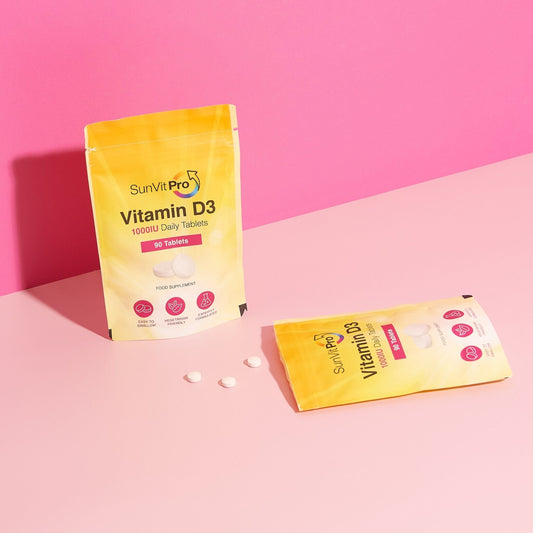
1 in 100 people in the UK have coeliac disease and many more have a gluten intolerance, making these conditions much more common than previously thought. People with such conditions may find it difficult to get all the vitamins and minerals they need; firstly, from not being able to digest and absorb nutrients as easily as the rest of the population. Another factor is that many foods and supplements contain gluten, or may be contaminated with traces of gluten (oats, for example). Read on to learn about these conditions and the implications it may have on your vitamin D intake.
1, What is gluten intolerance?
A food intolerance is when someone’s body has difficulty digesting certain foods and this can be presented by having an unpleasant physical reaction to them. A gluten intolerance refers to someone finding it difficult to digest the protein (known as gluten) which is present in wheat food products, such as bread.
2, What is coeliac disease?
Coeliac disease is more serious as it’s an autoimmune disease; the NHS’ definition of Coeliac disease is “a common digestive condition where the small intestine becomes inflamed and unable to absorb nutrients”.
It is caused by an adverse reaction to gluten, which can be found in a wide range of foods including; pasta, cakes, breakfast cereals, most types of bread, certain types of sauces and some types of ready meals. So, individuals with the condition must be careful to keep an eye on what they are eating to help avoid the symptoms that can be caused by gluten when you have celiac disease.
3, Are gluten intolerance and vitamin deficiency linked?
According to the Gluten Free Society one of the biggest challenges faced by patients with gluten sensitivity has to do with the deficiency of vitamins, minerals, and other dietary nutrients. Failure to address these nutritional deficiencies can lead to delayed healing and delayed response to a gluten free diet. The results of the study by the society was “Coeliac patients showed a higher total plasma homocysteine level than the general population, indicative of a poor vitamin status.” They came to these conclusions from the study; “Half of the adult coeliac patients carefully treated with a gluten-free diet for several years showed signs of a poor vitamin status.
No one wants to suffer through those symptoms, so if you have been diagnosed with the condition then it would be wise to avoid certain triggers.
Is vitamin D good for coeliac disease?
Public Health England (PHE) advises that to protect bone and muscle heath, everyone needs the equivalent to an average daily intake of 10 micrograms of vitamin D. In the winter it can be difficult to get enough vitamin D so individuals should consider taking a daily supplement to boost vitamin D levels.
“When you are first diagnosed with coeliac disease, the lining of your gut is damaged due to eating gluten. This can mean that you don’t absorb nutrients from food as well and can lead to nutritional deficiencies. Treatment with the gluten-free diet will heal your gut and improve the absorption of nutrients from food. Some people might need specific vitamin supplements and it is best for you to speak with your Health Practitioner for individual advice.” – Coeliac.org.uk
When anyone has a vitamin deficiency it is important to find a way of including them in your diet, whether that is through food sources or via supplements. Vitamin D deficiency can cause issues for both bone health and overall immune system strength, and as coeliac disease can affect the absorption of nutrients it is even more essential for those with the condition to make sure they are receiving the right levels of vitamin D.
An easy way to test your vitamin D levels is by having a simple blood test; SunVit-D3 have a simple to use blood test kit which can help you determine your vitamin D levels. The test is done in an independent laboratory and the results are emailed to you 7 working days after the test is received by the lab. You can order your blood test kit here.
Once you have received your test results it is always best to consult your Health Practitioner to see what their recommended dose would be for you as every case is individual.
Are there gluten free vitamin D supplements?
If you do have coeliac disease, rest assured when using our Vitamin D3 supplements; they are all gluten free vitamins, ideal for those with the condition or for anyone with a gluten intolerance.
We understand how important it is for everyone to be able to maintain healthy levels of Vitamin D, which is why we have developed our gluten free vitamin D supplements.













